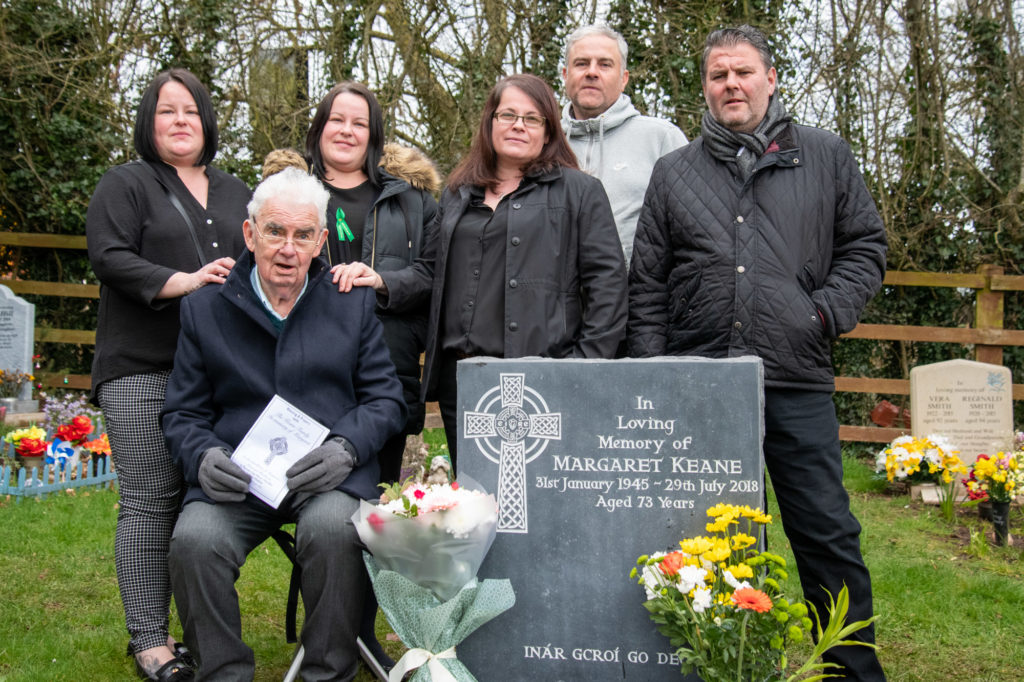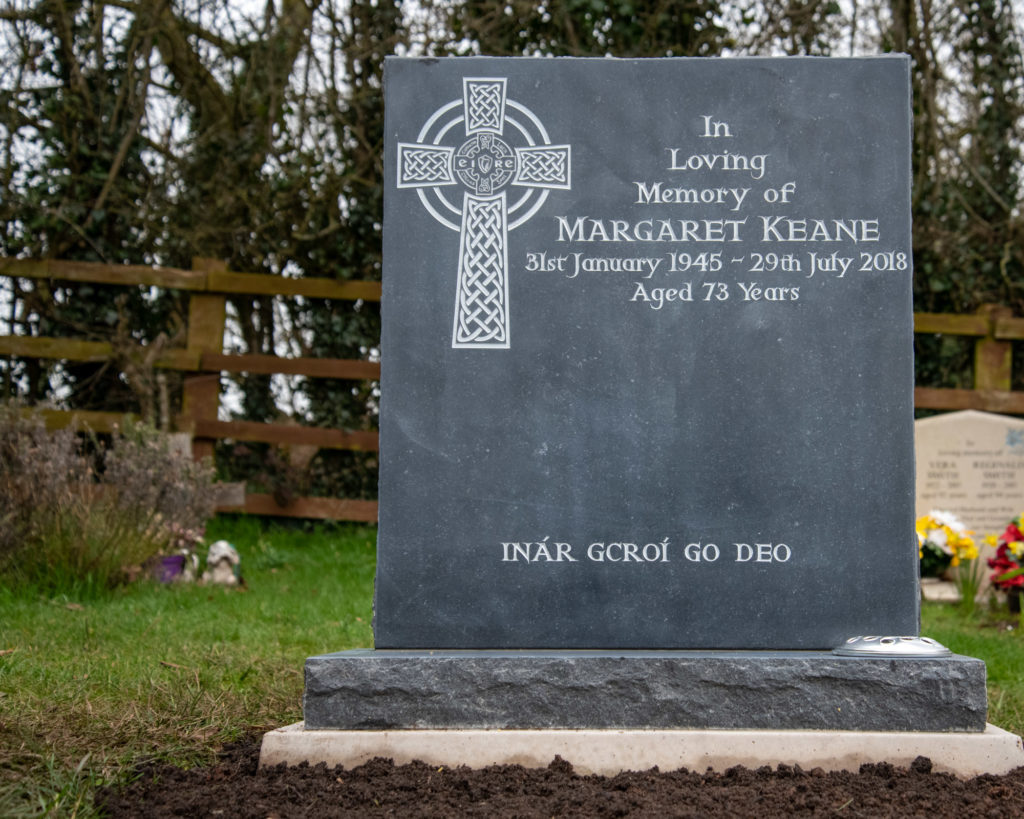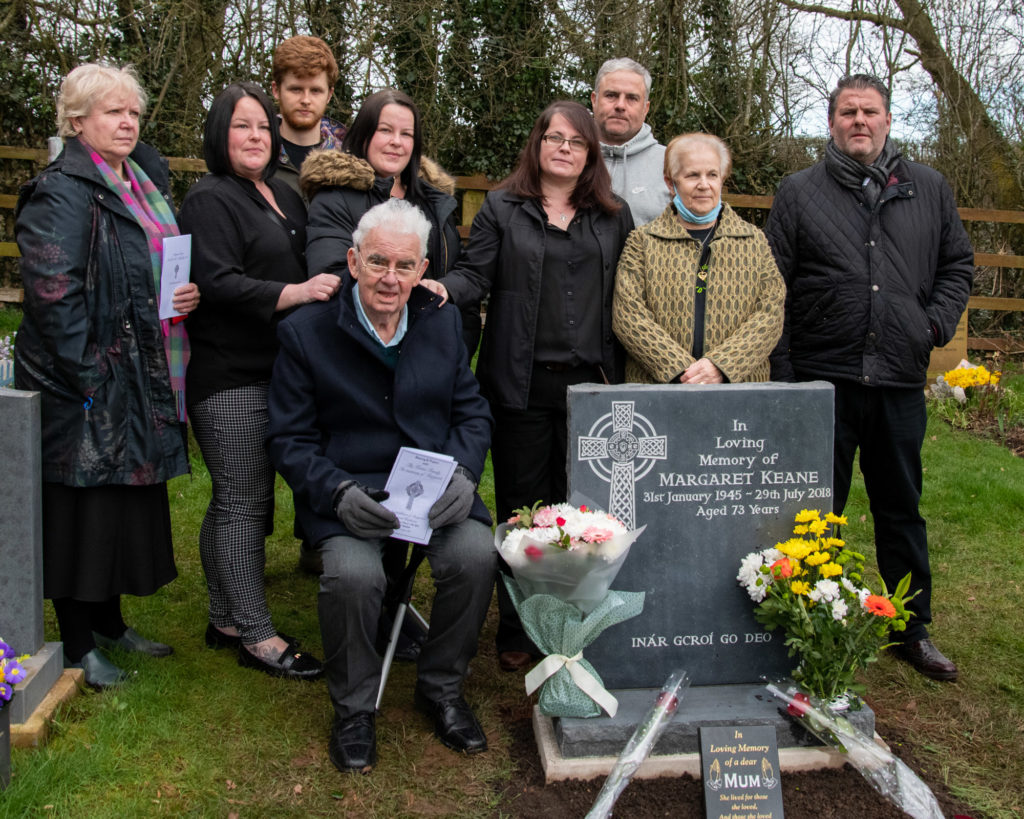A FAMILY who fought a lengthy battle to have their mother’s headstone inscribed in Gaelic have finally placed their intended tribute at her graveside.
Based in Coventry, the Keane family have endured an extremely emotional few years since their mother died in 2018.
Margaret Keane hailed from Co. Meath, but she and her husband Bernie became integral parts of the Irish community in Coventry after setting up home there many decades ago.
From her work as a school dinner lady, to her many years devoted to the Roger Casements GAA club, the mother of six was a popular and much loved local figure and also a proud Irishwoman.
 Margaret Keane's husband Bernie, seated, and children Caroline Newey, Donna Keane, Bernadette Martin, Michael and Vinne Keane at her graveside in Coventry (Pic: Chris Egan)
Margaret Keane's husband Bernie, seated, and children Caroline Newey, Donna Keane, Bernadette Martin, Michael and Vinne Keane at her graveside in Coventry (Pic: Chris Egan)When she passed, unexpectedly, three years ago, her family decided to inscribe her gravestone with the Gaelic phrase ‘Inár gcroí go deo’, meaning ‘In our hearts forever’.
But in May 2020 a Church of England ecclesiastical court ruled that the family’s intended phrase must be accompanied by a translation, because it could be deemed “political” without one.
The anti-Irish ruling sparked uproar across the Irish community in Britain and further afield.
Their appeal to have that decision overturned was upheld last month, following a hearing at St Mary-Le-Bow Church in London.
Following a full day in court on February 24, where the family’s legal team, barristers Caoilfhionn Gallagher QC and Mary-Rachel McCabe and solicitor Caroline Brogan, led the submissions on the Keane family’s behalf, the judge informed the family of their intention to grant their appeal.
 Margaret Keane's permanent headstone with the Gaelic inscription meaning "in our hearts forever" (Pic: Chris Egan)
Margaret Keane's permanent headstone with the Gaelic inscription meaning "in our hearts forever" (Pic: Chris Egan)A full judgement from that hearing is still due to be released, but the ruling allowed the family to continue with their intended memorial for their mother.
And on St Patrick’s Day, Wednesday, March 17, Margaret’s husband and their children were able to watch on as her headstone was finally installed by her grave at St Giles Church in Exhall.
“It was incredibly moving seeing the headstone for the first time,” Margaret’s daughter Bez Martin told The Irish Post.
“I felt the burden of the appeal washing away to be honest,” she added.
“There has been a huge sense of responsibility leading the campaign and the appeal,” she explained “not just on behalf of dad and the family but in the broader sense because we knew we were defending our very identity and the identity of so many others, with no actual guarantee of success.
 Margaret Keane's family with husband Bernie seated, Margarets' sisters Anne Taylor and Cath Carrigan, grandson Joesph Franklin, and children Caroline Newey, Donna Keane, Bernadette Martin, Michael Keane and Vinny Keane attended as the memorial was placed on St Patrick's Day (Pic: Chris Egan
Margaret Keane's family with husband Bernie seated, Margarets' sisters Anne Taylor and Cath Carrigan, grandson Joesph Franklin, and children Caroline Newey, Donna Keane, Bernadette Martin, Michael Keane and Vinny Keane attended as the memorial was placed on St Patrick's Day (Pic: Chris Egan“We embraced the journey with pragmatism and considered optimism, and I didn’t realise how heavy that was until I saw the headstone with the inscription.”
The family, who had been caught up in their legal battle for nearly a year, can now begin to mourn their mother properly.
“There is a huge sense of relief coupled with sadness now, as this is our final act for mum, but I know she can truly rest now,” Ms Martin admits.
“Knowing that there is now a legacy that accompanies the name of our mum fills us with immense pride,” she added.

